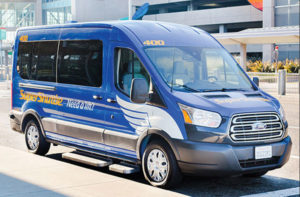NATIONAL REPORT—Properties offering shuttle service to guests are required by law to provide equivalent services to individuals with disabilities. There are some overlooked aspects of the law they may need to consider.
“Title III of the Americans with Disabilities Act (ADA) requires public accommodations that provide equal access to goods and services for those with disabilities,” said Frank C. Morris Jr., member of Epstein Becker Green, an employment law firm. “Specifically, the ADA requires ‘the full and equal enjoyment of the goods, services, facilities, privileges, advantages or accommodations of any place of public accommodations by any person who owns, leases (or leases to), or operates a place of public accommodation.’”
The shuttle service that properties offer to individuals with disabilities must be as convenient as the service provided to individuals without disabilities. “If a property provides shuttle service to support the primary business, it must provide equivalent service for people with disabilities,” Morris said. Areas to consider include fares, schedules or response times, hours of operation, pick-up and drop-off locations, and other measures of equivalent service.
To provide equivalent service to individuals with disabilities, properties can acquire accessible vehicles or contract with other companies to provide accessible transportation services when needed; however, this doesn’t mean properties can necessarily contract away ADA obligations.
“If the hotel does not have accessible vehicles and a request is made for accessible transportation, the hotel must be able to provide an alternative transportation service that is accessible with similar response time and no difference in cost from what is normally charged for the shuttle service,” said Robert S. Fine, shareholder at Greenberg Traurig, an international law firm.
Properties may want to consider examining particular services and needs for individuals with disabilities. Examples include lifts, ramps, securement devices (straps for securing wheelchairs on board), and braille and tactile signage.
“Among other issues properties offering shuttle services often face are whether the pick-up location is on an accessible path of travel, meaning that it is sufficiently wide, stable and with a smooth surface, no excessive slopes or puddling, and with appropriate curb cuts,” Morris said.
For some management companies, it’s not just about following the law; there’s also a need to go above and beyond. “For Olympia, specialized services come in the form of sensitivity and support by our staff,” said John Schultzel, VP of hotel management at The Olympia Companies. “We provide personal assistance with loading/unloading, baggage, wheelchair assistance, etc. We make every effort to provide necessary assistance on and off the shuttles.” To date, Olympia has equipped all of its vehicles with lifts. Olympia’s shuttle drivers are dedicated roles, and background checks, driver safety checks and driver safety training are all conducted by the company.
“What I can tell you is, yes, we do provide accessible service in all of our SuperShuttle locations,” said Margaret Nathan, a spokesperson for SuperShuttle, a company specializing in airport transfer services for cities across the globe. “Obviously, the service level and pricing is identical to that of our non-accessible service. We would never require additional fees to transport any request with accessibility needs.”
The company does provide a few different models of accessible vehicles. SuperShuttle conducts training for its ADA transportation specialists every year. As for the reasoning, the transportation services company believes the annual training helps its drivers with enhancing the customer experience.
“The drivers who drive the disabled community are amazing,” Nathan said, speaking from personal experience (she was with a prior boss when he used SuperShuttle’s accessible service). “They’re very professionally trained. They’re just delightful people and know how to be helpful in ways that you as the personal friend don’t know how to be helpful.”
There are some aspects of the ADA’s Title III commonly overlooked by properties. “Information on the shuttle service must be provided in accessible formats,” Fine said. Properties may want to take mobile devices with screen-reading technology into consideration when building websites.
Additionally, a person using a wheelchair must have sufficient space in a wheelchair-designated location. “When a person using a wheelchair does not have sufficient space in a wheelchair-designated location because it is occupied by a person who is not disabled, the transit personnel is required to ask the person who is not disabled to move to provide the necessary space when such space is available, but the transit personnel are not required to enforce the request,” he said. Also, service animals must be allowed.
“The property may not require that the handler produce a license or certification from a state or local government to prove that the animal is a service animal,” Morris said. “The only questions that can be asked are whether the animal is a service animal and whether it has been trained to provide assistance to an individual with a disability. If a person with a service animal does not need a vehicle equipped for individuals with mobility impairments, the service animal must be permitted to accompany its handler on the regular shuttle.”
There are no expected changes to Title III of the ADA in the immediate future; however, there’s one possible exception—this potential outcome, though, is primarily dependent on Congress’ legislative priorities for 2018.
“There is proposed legislation that would require an individual who wishes to pursue a Title III ADA case to give the property owner or operator notice of any alleged ADA violation and some period,” Morris said. “For example, 90 days to remedy the alleged violation. Such legislation has been previously proposed, and it is by no means certain that it will be adopted in the current Congress.”
That being said, many states and local jurisdictions have their own anti-discrimination laws, which exceed the requirements of the ADA. More often than not, compared to the ADA’s punishments, these laws have harsher sanctions, including monetary damages and civil penalties.
“Hotels should take care to understand the state and local laws and rules of the jurisdiction they are located in,” Fine said. HB





